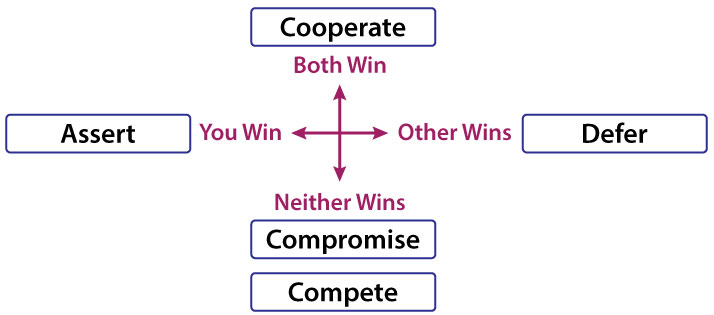Resolving Conflicts

Whenever people work together, conflicts arise. The strategies on this page work well for routine disagreements but not for serious conflicts—when one side is harassing or abusing the other. In such situations, you need to seek help from colleagues, Human Resources, counseling services, or even law enforcement.
Defining the Conflict
When a routine conflict occurs, you should quickly analyze it by answering four questions:
What is the problem?
“David wants to develop a new product line, but I think we need to support the lines we already have.”
What is my purpose in the situation?
“I want to make sure we make sales goals for existing products.”
Who are the people involved?
“David is head of Development, and I am head of Marketing, competing for budgets.”
Where is the conflict taking place?
“It is occurring in the management meeting when we discuss new initiatives.”
Managing Your Emotions
A small-scale conflict can escalate if emotions get out of hand. Start by identifying the emotion you are feeling and why you are feeling it. Note whether the emotion is appropriate to the situation, and decide how you will manage it, using one of these strategies:
Express the emotion but set it aside to think critically.
“My gut tells me this is a bad idea, but let me hear why you like it.”
Modulate the emotion to better match the situation.
“I overreacted, but this is a serious issue, and we need to be sure about it.”
Use the emotion constructively to engage the task.
“We can't ignore this problem. Let's get this hashed out.”
Allow your emotion to connect you with others.
“I can tell that you are passionate about your plan, but I'm passionate about mine. Can we find a way forward?”
Recognize that emotion will play a part in decision making.
“In the end, we need to be happy with the result, and we're not currently happy.”
Resolving Conflicts
You have options for resolving conflicts. Different situations call for different resolutions.

Cooperate with the other person, working for the common good.
Compromise with the other, each giving up something to meet in the middle.
Assert your position if you have authority, know you are right, or find alternatives unacceptable (but avoid insubordination).
Defer to the other if you do not have authority, are wrong, or consider the issue not worth fighting over.
Compete with the other, each trying a different approach to see which works (but avoid insubordination).